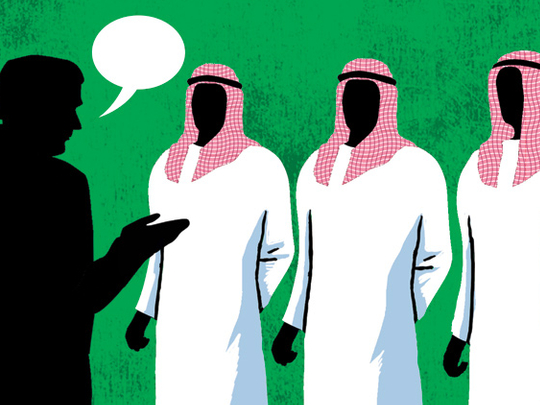
Many Saudis falsely assume that they are from a ‘special’ culture that has unique traditions and that sets them apart from others. I imagine that housing two of Islam’s holiest shrines within their borders adds to that myth. But are such assumptions that erroneous? Is there any truth in the suppositions of these people who feel they are a cut above the rest?
To understand one’s self, it is sometimes best to look through the eyes of the others. What others think about us may be a more critical and realistic view than what we would like to think of ourselves. Much of their impressions are often left unspoken, but when some people do speak out, their opinions offer an unusual perspective on what we are all about.
A south Indian gentleman working in the kingdom for a number of years is one such individual who dared break the shackles of silence and whose words deserve to be heard. His is a candid viewpoint from one who lives and works amongst us.
He says: “I always think of the problems of Saudi society a lot. It does not mean my society is perfect! Do you know what my thought was before I came to Saudi Arabia as an expatriate? My thought was that all Saudis were good in honesty, prayer and many other things. When an international soccer event was held in my home city of Calicut more than three decades ago, I would greet team members from the Middle East with a ‘salaam alaikum’ as they strolled around the city!
“What I wish to tell you is that today, sermons, speeches, writings or advices are not reaching the people. That is the main problem that this society now faces. Even for the Jum’a prayer, people are arriving at the mosque barely moments before the prayer starts. Most of the people below 35 do not even read the newspapers in most parts of the world and in Saudi Arabia in particular.
“When I discuss politics with Saudi my colleagues, most of them have no opinions to offer; no reactions, simply indifference. A bomb explodes in Syria/ Iraq/Palestine ... and yet they seem far removed from it and have nothing to be worried about. A bold statement from a Middle East leader draws no reaction from them. This is the time to wake up and think of a plan on how to change society’s perception of global events.”
Holding the Saudi media responsible for this to a degree, he offered tips on what he believed could help Saudi society.
“There are some other areas that need to be addressed by people in the media. We need the press to continuously highlight the issue of domestic abuse and teach people how to protect their daughters and sisters. There is a huge communication gap between people, even between neighbours. We need heightened awareness.
“This starts by allowing the children to enjoy mixed-gender education in the primary classes. It will help address anti-social behaviour and sexual harassment. Another area of urgency is a strong anti-smoking campaign. A recent study said that the kingdom was among the leading countries in the world in tobacco consumption. More importantly, all you writers and intellectuals should sit together and think what to do to revise things other than mere writings,” he said.
The Prophet Mohammad (PBUH) had encouraged good relations with neighbours and said that a “neighbour” is not just the one next door, but includes all those up to seven doors away — effectively a whole neighbourhood. In that respect, my south Indian friend added: “In my village, all people within a three to four-kilometre radius know each other. In the cities also people within a kilometre know each other. We go to each other’s home if necessary and due to this, no sister is preyed upon for rape or harassment. It is most important to know each other.”
He also wondered why there was no evident connection between parents and their children in Saudi Arabia. He questioned: “Why do people jump red signals at intersections — a clear violation. Why is a crazy motorist allowed to drive on the roads? That driver may be ready to go to hell, but why should he take me?
“Why are people of other GCC [Gulf Cooperation Council] nations better-behaved? Why don’t we [Saudi Arabia] send the kingdom’s airport staff to other GCC countries to learn to be polite towards passengers? People from around the world are arriving to Saudi Arabia — the cradle of Islam.
But from the very first door of the country itself — the airport — their thoughts about Islam are often affected by the merciless behaviour of the staff.
Passengers are usually tired upon arrival and they need kind words and consideration from the staff.”
He concluded his views by offering tips on how to solve some of the Saudi society’s ills.
“We need the social intellectuals from all parts of Saudi Arabia to sit together, think aloud and draw up action plans in every possible way. And finally, we need to start from our own kitchen — to enable people to develop a good mindset and goals. People need awareness in all areas: Life, job, business, education, etc, etc.”
As I wrote earlier, we can learn a lot about ourselves through the eyes of others. And this south Indian gentleman has given us plenty to think about.
Ramadan Kareem.
Tariq A. Al Maeena is a Saudi socio-political commentator. He lives in Jeddah, Saudi Arabia. You can follow him on Twitter at www.twitter.com/@talmaeena










